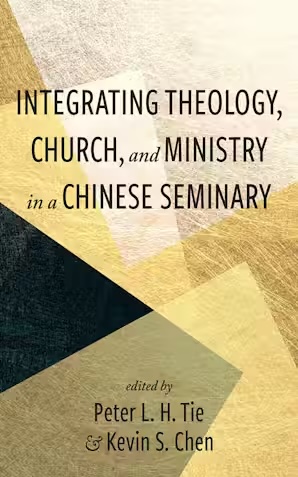A perennial challenge for theological education is the integration of what is learned in the class with students’ church life and ministry. Whereas some of the underlying issues are common to all seminaries, others are influenced by the cultural context in which theological education, church life, and ministry take place. Integrating Theology, Church, and Ministry in a Chinese Seminary, edited by Peter L. H. Tie and Kevin S. Chen, represents the efforts and reflection of experienced scholar-practitioners who work out a vision for integration in the context of a diaspora Chinese seminary in San Jose, California.
The following excerpt comes from Dr. Chen’s chapter: “Integration of Faith, Learning, and Ministry: From Union University to Chinese Theological Education.”
Challenges to Integration for Seminaries Generally
Although less focused on setting forth the unity of knowledge across all academic disciplines, theological education, such as is commonly done in seminaries, faces significant challenges of integration as well. The courses within the curriculum, though certainly valuable in and of themselves, can sometimes feel disjointed and not obviously related to one another. To cite a common example, there can seem to be a gap between Bible and theology courses and ministry or practical theology courses. Oftentimes the real value (and hence purpose) of biblical language courses is also called into question. Do they belong in the curriculum, and if so, to what extent? Within individual disciplines, such as my own (biblical studies), there is also fragmentation resulting from specialization and varied methodologies, with some methodologies even arguing that the biblical material is itself fragmented (e.g., source criticism). These examples involve essentially the same issue of fragmentation discussed above, but limited to seminary coursework.
Perhaps even more pressing is whether seminary studies help (or even hinder) seminary students’ personal spiritual growth and how much seminary prepares them practically for ministry. Whereas disjointed courses may be able to be addressed at least partially by better integrating faith and learning (see above), the disconnect between seminary, students’ spiritual growth, and ministry must be addressed by an even broader integration of faith, learning, and ministry. In the discussion below, which I intend not as the last word but in hopes of generating further dialogue, I focus on this broader integration.
I begin by acknowledging the pressing importance of students’ spiritual growth and the seminary’s need to train effective ministers. If, for example, seminary hurts students’ spiritual growth, then something is seriously wrong (e.g., the criticism of “seminary” as a “cemetery”). When this does happen, the reasons can vary from the seminary itself espousing liberal theology, students being overcommitted such they cannot give enough time to their spiritual health, and/or the seminary failing to sufficiently prioritize and/or attend to the spiritual needs of their students. Likewise, if seminaries are not effectively training ministers for churches and other parachurch organizations, what is the point of investing the time, money, and energy to attend?

Integrating Theology, Church, and Ministry in a Chinese Seminary is available for purchase from WIPF and Stock Publishers.

Reflections on the Bible Teaching Conference
Hear from attendees what they learned at the Bible Teaching Conference.

Lessons from Twenty-Five Years of Preaching God’s Word
I am unashamedly an expository preacher. My first sermon, however, was not.

Comfort Twice Over
When we provide comfort to fellow believers, we are the means by which God has chosen to provide his comfort.




